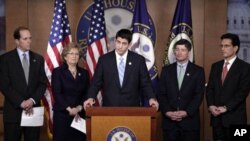Days after a grueling, partisan battle on federal spending ended with a bill to fund the U.S. government through September, a new battle is underway over America’s long-term fiscal woes. Democrats and Republicans are offering competing visions to reduce a $1.5 trillion federal deficit and slow the growth of a $14 trillion national debt. A complicating factor is the need to raise the limit on the amount of money the U.S. government can borrow to cover its debt obligations.
Like any government that spends more than it collects in revenue, the U.S. government borrows what it needs to close the budget gap. The amount that can be borrowed is capped by law - a so-called "debt ceiling". Periodically, Congress must set a new, higher limit to allow additional borrowing. Failure to raise the debt ceiling could cause the federal government to default on its obligations to lenders, including creditor nations like China.
Weeks from now, the U.S. government will once again bump up against the borrowing limit. But raising the debt ceiling is politically unpopular. In the past, Democratic and Republican legislators have railed against doing so, including Barack Obama before he became president.
In 2006, then-Senator Obama voted against raising the debt limit, which he said reflected "leadership failure" in Washington under then-President George W. Bush.
Obama has since said he regrets the vote, calling it a mistake. The White House is urging Congress to promptly raise the debt ceiling to reassure credit markets and avoid even the suggestion that the United States might not honor its obligations.
Treasury Secretary Timothy Geithner says he is confident Congress understands the gravity of the situation.
"Congress will raise the debt ceiling," he said. "They [congressional leaders] recognize that America has to meet its obligations."
Geithner spoke on ABC’s This Week television program. The treasury secretary said, during a meeting at the White House last week, congressional leaders assured President Obama that they would act on the debt ceiling.
But Republicans, who control the House of Representatives, are attaching a condition to the debt-ceiling vote. They want an agreement with Democrats and the White House on federal-spending reductions. House Budget Committee chairman of Wisconsin spoke on CBS’ Face the Nation television program.
"Nobody wants to play around with the country’s credit rating. Nobody wants to see default happening. But we also think it is important to get a handle on future borrowing as we deal with raising the debt limit. We should not ignore the spending problem. It is why we have this debt problem in the first place."
Republican Senator Tom Coburn of Oklahoma was even more blunt, saying he will not vote to raise the debt ceiling without guarantees of spending cuts.
"I need absolute certainty that we have made the critical changes that are necessary to put this country back where it needs to go [fiscal solvency]," he said. "And unless we do that, there is no way I support it [raising the debt limit]."
Coburn spoke on Fox News Sunday.
Democrats say they are committed to deficit reduction, but warn that tying budget negotiations to the debt ceiling would invite financial ruin. Also appearing on Fox News Sunday was Chris Van Hollen, the top Democrat on the House Budget Committee.
"We have to make good on the full faith and credit of the United States [debt obligations]. Otherwise we will have an economic catastrophe," he said. "Saying you are only going to vote for the debt ceiling if something particular happens on deficit reduction is like playing Russian roulette with a fully-loaded revolver."
If Republicans hold firm on demanding a deficit reduction deal before allowing the debt ceiling to rise, negotiations could be the most furious and contentious yet seen in the ongoing budget debate. Republicans favor deep cuts in domestic spending as a primary tool to achieve fiscal balance. Democrats acknowledge the need for spending restraint, but say tax hikes on the wealthy should be part of a comprehensive deal.





